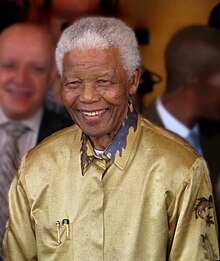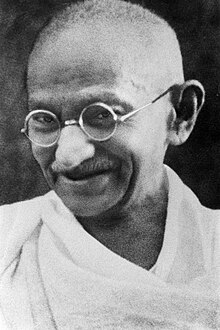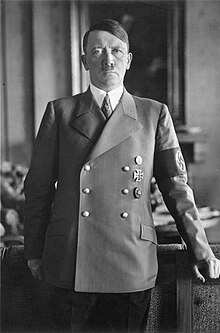Jawaharlal Nehru (/ˈneɪruː, ˈnɛruː/;[1] Hindustani: [ˈdʒəʋaːɦərˈlaːl ˈneːɦru] ( listen); 14 November 1889 – 27 May 1964) was the firstPrime Minister of India and a central figure in Indian politics before and after independence. He emerged as the paramount leader of the Indian independence movement under the tutelage of Mahatma Gandhi and ruled India from its establishment as an independent nation in 1947 until his death in 1964. He is considered to be the architect of the modern Indian nation-state: a sovereign, socialist, secular, and democratic republic. He was also known as Pandit Nehru due to his roots with Kashmiri Panditcommunity while many Indian children knew him as "Uncle Nehru" (Chacha Nehru).[2][3]
listen); 14 November 1889 – 27 May 1964) was the firstPrime Minister of India and a central figure in Indian politics before and after independence. He emerged as the paramount leader of the Indian independence movement under the tutelage of Mahatma Gandhi and ruled India from its establishment as an independent nation in 1947 until his death in 1964. He is considered to be the architect of the modern Indian nation-state: a sovereign, socialist, secular, and democratic republic. He was also known as Pandit Nehru due to his roots with Kashmiri Panditcommunity while many Indian children knew him as "Uncle Nehru" (Chacha Nehru).[2][3]
The son of Motilal Nehru, a prominent lawyer and nationalist statesman and Swaroop Rani, Nehru was a graduate of Trinity College, Cambridge and the Inner Temple, where he trained to be a barrister. Upon his return to India, he enrolled at the Allahabad High Court, and took an interest in national politics, which eventually replaced his legal practice. A committed nationalist since his teenage years, he became a rising figure in Indian politics during the upheavals of the 1910s. He became the prominent leader of the left-wing factions of the Indian National Congress during the 1920s, and eventually of the entire Congress, with the tacit approval of his mentor, Gandhi. As Congress President in 1929, Nehru called for complete independence from the British Raj and instigated the Congress's decisive shift towards the left.
Nehru and the Congress dominated Indian politics during the 1930s as the country moved towards independence. His idea of a secular nation-state was seemingly validated when the Congress, under his leadership, swept the 1937 provincial elections and formed the government in several provinces; on the other hand, the separatist Muslim League fared much poorer. But these achievements were seriously compromised in the aftermath of the Quit India Movement in 1942, which saw the British effectively crush the Congress as a political organisation. Nehru, who had reluctantly heeded Gandhi's call for immediate independence, for he had desired to support the Allied war effort during the Second World War, came out of a lengthy prison term to a much altered political landscape. The Muslim League under his old Congress colleague and now bête noire, Muhammad Ali Jinnah, had come to dominate Muslim politics in India. Negotiations between Nehru and Jinnah for power sharing failed and gave way to the independence and bloody partition of India in 1947.
| Pandit Jawaharlal Nehru | |
|---|---|

Jawaharlal Nehru in 1947
| |
| 1st Prime Minister of India | |
| In office 15 August 1947 – 27 May 1964 | |
| Monarch | George VI (until 26 January 1950) |
| President | Rajendra Prasad Sarvepalli Radhakrishnan |
| Governor General | The Earl Mountbatten of Burma Chakravarti Rajagopalachari (until 26 January 1950) |
| Deputy | Vallabhbhai Patel |
| Preceded by | Position established |
| Succeeded by | Gulzarilal Nanda (Acting) |
| Minister of Defence | |
| In office 31 October 1962 – 14 November 1962 | |
| Preceded by | V. K. Krishna Menon |
| Succeeded by | Yashwantrao Chavan |
| In office 30 January 1957 – 17 April 1957 | |
| Preceded by | Kailash Nath Katju |
| Succeeded by | V. K. Krishna Menon |
| In office 10 February 1953 – 10 January 1955 | |
| Preceded by | N. Gopalaswami Ayyangar |
| Succeeded by | Kailash Nath Katju |
| Minister of Finance | |
| In office 13 February 1958 – 13 March 1958 | |
| Preceded by | Tiruvellore Thattai Krishnamachariar |
| Succeeded by | Morarji Desai |
| In office 24 July 1956 – 30 August 1956 | |
| Preceded by | Chintaman Dwarakanath Deshmukh |
| Succeeded by | Tiruvellore Thattai Krishnamachariar |
| Minister of External Affairs | |
| In office 15 August 1947 – 27 May 1964 | |
| Preceded by | Position established |
| Succeeded by | Gulzarilal Nanda |
| Personal details | |
| Born | 14 November 1889 Allahabad, North-Western Provinces, British India (now in Uttar Pradesh, India) |
| Died | 27 May 1964 (aged 74) New Delhi, India |
| Political party | Indian National Congress |
| Spouse(s) | Kamala Kaul |
| Children | Indira Gandhi |
| Parents | Motilal Nehru and Swaruprani Thussu |
| Alma mater | Trinity College, Cambridge Inns of Court |
| Profession | Barrister writer politician |
| Signature | |
Nehru was elected by the Congress to assume office as independent India's first Prime Minister, although the question of leadership had been settled as far back as 1941, when Gandhi acknowledged Nehru as his political heir and successor. As Prime Minister, he set out to realise his vision of India. The Constitution of India was enacted in 1950, after which he embarked on an ambitious program of economic, social and political reforms. Chiefly, he oversaw India's transition from a colony to a republic, while nurturing a plural, multi-party democracy. In foreign policy, he took a leading role in Non-Alignment while projecting India as a regional hegemon in South Asia.
Under Nehru's leadership, the Congress emerged as a catch-all party, dominating national and state-level politics and winning consecutive elections in 1951, 1957, and 1962. He remained popular with the people of India in spite of political troubles in his final years and failure of leadership during the 1962 Sino-Indian War. In India, his birthday is celebrated as Children's Day.



.jpg)




